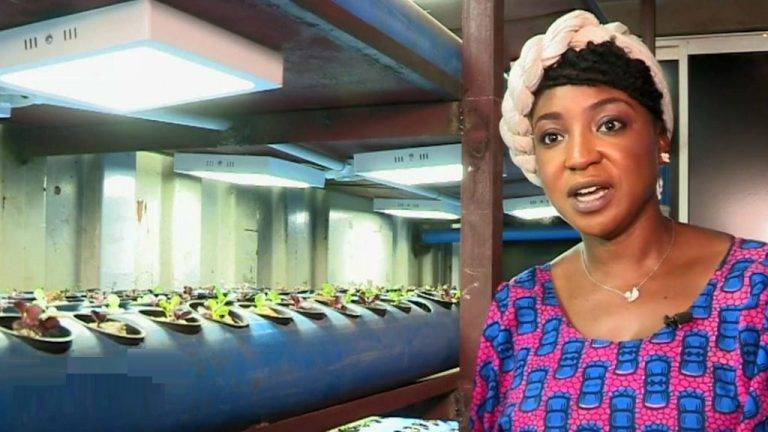Growing Exotic Veggies With Neither Soil Nor Sunlight And Only Little Water – Meet The Magician From Nigeria

Make no mistake about it; somewhere in Nigeria, there’s an ‘Angel’ who is growing exotic vegetables with no soil and very little water. Yes, you read that right: no soil and very little water! And nothing magical or celestial.
The said Nigerian is pioneering hydroponic agriculture in the country and using the innovative farming method to achieve up to fifteen-times the yield despite using ten-times less land. Sounds crazy, doesn’t it? But it’s so true.
Like it or not, our world continues to evolve under our very noses, and despite our best efforts, we are barely keeping up with the newest demands of the perpetual evolution – especially in the area of agriculture.
Sure, there’s hardly any doubt that we are producing more food than ever before but the sustainability of our current model is in a precarious situation, especially as the world’s population seems very likely to do a geometric progression in the next few years and climate change seems destined to reach worrying levels.
Angel Adelaja
Source: woman.ng
Thus, a paradigm shift has become imperative if there is to be any hope of getting one over mother nature. And this is where innovative approaches to agriculture like vertical farming which entails growing food in vertically-stacked layers, and hydroponics which involves growing food with no soil and little water, can be leveraged to telling effect.
And Angel Adelaja appears to be making significant headway on that front. The Nigerian farmer has created a revolutionary stackable container farm, which is essentially an aggregation of vertical farming and hydroponics. She grows crops in jettisoned and decommissioned shipping containers which are easily available. Ideally, a single container is suitable for growing an acre and half of the veggies.
Adelaja is one of the co-founders of We Farm Africa and CEO/founder of Fresh Direct Produce and Agro-Allied Services. While the former venture was borne out of the need to make urban farming commonplace, the former is a social enterprise that is pioneering hydroponic agriculture in Nigeria.
“When we started Fresh Direct, we realised that new technology could make the difference that African agriculture needed. Unfortunately, we needed to import technology, and it was too expensive. So we decided to innovate and create our technology from indigenous materials,” Adelaja revealed in a conversation with The Way Women Work.
The Nigerian entrepreneur, who has a background in biostatistics and epidemiology and who learned about hydroponics from online resources, was driven by a passion which revolved around making urban farming easy and accessible to everyone.
Source: innovation-village.com
And that culminated in the creation of a one-of-a-kind stackable container farm that could be considered one of the most affordable in the world. And the whole thing is put together in Abuja, Nigeria.
“We started with an empty plot of land and a lot of stress. But we tried, and it worked. We’re the first in containerised farming in Africa,” Adelaja told BBC.
Well-groomed fields or nutrient-rich soil is not required in this farming practice. Hydroponics is the method used by the team to grow leafy greens and luxury salads inside regular shipping containers. Adelaja and her team are able to grow those vegetables using only nutrient-infused water and LED light.
The farming method makes it possible to grow a variety of produce all year round regardless of seasonal variations, including those that are not ordinarily suited to growing in the Nigerian climate.
Source: naijalifemagazine.com
Through her establishment, Adelaja offers job security and employment opportunities to many urban farmers who are mainly young women. She is determined to rewrite the narrative which puts the average age of a Nigerian farmer at 60 years. She also hopes to engineer this change by making agriculture ‘cooler’ with practices such as this which she believes will get more young people involved in the sector.
And it bodes well for the venture that the abandoned shipping containers which house their farms are quite easy to find in Nigeria. Many of those are even found lying abandoned on roadsides, and the availability of the metal boxes could aid the scalability of the business.
Adelaja’s container farms are also situated in strategic locations, and the proximity to major markets effectively cuts down on delivery times.
And don’t be alarmed that some of the vegetables grown are elaborately described as ‘luxury foods,’ for they still come on the cheap when compared to imported produce.
The progress of her venture has been impeded by lack of electricity and water at various points, as well as having to hire and train a number of new employees. As a way of remedying the unpalatable power situation, the business uses generators, but even that is hampered from time to time by fuel price hikes and intermittent scarcity of the hydrocarbon.
Source: lindaikejisblog.com
But Adelaja remains undeterred in her bid to prove that even small pieces of land in urban centres and gentrified metropolis can host large, sustainable farms that are capable of yielding sufficient quantities of produce all year round. She hopes to simplify agriculture in Nigeria, and the world at large eventually.
Her company, Fresh Direct, currently boasts multiple divisions which imply that besides farming, it also takes up the production of affordable technologies, like the stackable container farm, as a way of helping low-income individuals become financially independent.
Adelaja has garnered commendation and recognition for her work as she had been featured on notable publications both home and abroad. Her work also earned her place in the finals of the prestigious Chivas The Venture competition where she bagged a cash prize to the tune of NGN 1 Mn.
Featured Image Courtesy: BBCNews Africa